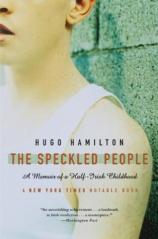Reading Group Guide
Discussion Questions
The Speckled People: A Memoir of a Half-Irish Childhood

1. Hugo Hamilton narrates this autobiographical memoir in the voice of a child. Why do you think he chose to filter his experiences this way? Does the child narrator say things that are too complicated for a child's voice?
2. Wearing German lederhosen with Irish sweaters, Hugo views himself as "Irish on top, and German below (p.2)," and thinks that "as a child you're like a piece of white paper with nothing written on it. My father writes down his name in Irish and my mother writes down her name in German and there's a blank space left over for all the people on the outside who speak English (p.3)." Do you think the English speakers have as much a claim to his identity as his mother and father? What do the English speakers outside have to say about his disjointed Irish/German identity? How does he negotiate between the three?
3. Compare the Hamilton's visit to An Cheathru Rua to their visit to Germany. An Cheathru Rua "was like being at home in the place where we all wanted to be for the rest of our lives (p.179)," and in Germany, "Nobody would ever call us Nazis. My father would have lots more friends and my mother would have all her sisters to talk to (p.217)." In one location, the whole family finds a united Irish identity, in the other, a German one. Are these identities assumed or real? Do you think it matters? How and why do they become foreign three times over once in Dublin?
4. Hugo's father "had the big idea of bringing people from other countries over to Ireland (p.39)," and after marrying the German Irmgard Kaiser, believed that his children would be the "new Irish." What does he mean by "new Irish"? Is it contradictory to expect multicultural children to be more authentically "Irish"?
5. Compare the qualities the novel attributes to the "fist people" and the "word people." Which term best describes Hugo's mother? His father?
6. Onkel Gerd instructs young Irmgard and her sisters to use the silent negative when swearing allegiance to the FŸhrer. Irmgard uses the silent negative when assaulted by Stiegler, and instructs her sons to do the same when they are taunted and called Nazis. Given each circumstance, how effective is this as a form of resistance?
7. By the end of the novel, what does Hugo's father regret the most? His mother? Does his father accept losing "the language war"? What meaning would you ascribe to each parent's use of the phrase "[I would] make different mistakes this time (p.282, p.289)"?
8. Hugo describes several incidents in which family violence turns to comedy then sometimes to sadness. For instance, when Hugo's father threw appelkompost at Hugo at the dinner table (and his mother started laughing), when the children threw mashed potato at the ceiling (where the lumps stuck), when Hugo threw an egg at his mother (and it became a game they played)-tension dissolves into laughter. How does comedy work in these situations?
9. When Hugo is being beaten by bullies in the changing shed, his tormentors accuse him of being a Nazi. What happens when he acts like he is one? How do they react when he yells "Sieg Heil, Donner Messer Splitten, Himmel Blitzen" (p.292) and other nonsense words? When he throws his own shoes into the sea? Does this scene make you laugh or make you uncomfortable? How does humor protect Hugo? "Laugh at yourself and the world laughs with you. Execute yourself and nobody can touch you" (p.294)-do you agree?
10. Hugo's mother alleviates her homesickness for Germany by dressing her sons in lederhosen, maintaining German Christmas traditions, basically creating a German domestic life for her family within the confines of their home. Meanwhile, Germany itself divides politically and physically, so when she returns "she was lost. She couldn't recognize anything (p.296)." The home she longs for no longer exists. What, ultimately, can be considered "home"? How does The Speckled People resolve this question?
The Speckled People: A Memoir of a Half-Irish Childhood
- Publication Date: August 17, 2012
- Paperback: 304 pages
- Publisher: Harper Perennial
- ISBN-10: 0007156634
- ISBN-13: 9780007156634






